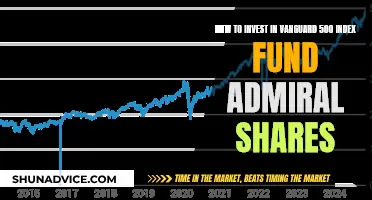
Index funds are a type of investment fund that tracks the performance of a particular stock market index. They are passively managed, meaning the fund manager doesn't alter the portfolio's composition and instead invests in the same securities that are present in the underlying index in the same proportion. This makes them a low-cost way to invest, as they have lower management fees compared to actively managed funds. Index funds are also diversified, as they are invested across all stocks in an index, and they offer consistency and transparency. However, they cannot outperform the index and are subject to market risk. In India, some of the popular indexes that are tracked include the Nifty 50, BSE Sensex, and NSE Nifty.
| Characteristics | Values |
|---|---|
| Type of Fund | Investment fund, Mutual fund, Exchange-traded fund (ETF) |
| Purpose | Track performance of a specific market index |
| Examples of Tracked Market Indexes | Nifty 50, NSE Nifty, BSE Sensex, S&P 500, Dow Jones Industrial Average |
| Investment Strategy | Passive |
| Management | Passively managed |
| Investment Composition | Same stocks in the same proportions as the tracked market index |
| Returns | Same as the tracked market index |
| Costs | Low operating costs, lower expense ratios |
| Diversification | High |
| Risk | Low |
| Tax Efficiency | High |
What You'll Learn

Understanding Index Funds
Index funds are a type of mutual fund or exchange-traded fund (ETF) that aims to mirror the performance of a specific market index, such as the Nifty 50, BSE Sensex, S&P 500, or Dow Jones Industrial Average. They are designed to provide investors with a low-cost, diversified investment option.
Index funds are passively managed, meaning the fund manager does not actively select individual stocks or try to outperform the market. Instead, they replicate the composition of the underlying index by investing in the same securities and in the same proportions. This results in lower fees and expenses for investors compared to actively managed funds.
Index funds offer a straightforward way to invest in a broad range of stocks, providing exposure to the entire market or a specific sector. They are suitable for investors seeking a long-term, low-cost investment strategy, as they provide consistent returns over time by tracking the performance of the index.
The main features of index funds include:
- Passive management: Fund managers replicate the index composition instead of actively selecting stocks.
- Low cost: Index funds have lower management fees and expenses due to their passive nature.
- Diversification: Index funds invest in a diversified portfolio of securities, reducing the risk associated with individual stock selection.
- Consistency: Index funds provide consistent long-term returns by tracking the performance of the market index.
- Transparency: The holdings of an index fund are transparent, as they mirror the published list of securities in the underlying index.
Overall, index funds offer a simple and cost-effective way to invest in the stock market, making them attractive to both beginner and advanced investors.
Investing in 1confirmation: Strategies for Crypto Venture Capital
You may want to see also

How Index Funds Work
Index funds are a type of mutual fund that aims to mirror the performance of a specific market index, such as the Nifty 50 or Sensex. They are passively managed, meaning the fund manager does not alter the portfolio's composition but instead invests in the same securities that are present in the underlying index in the same proportion. This passive management strategy aims to provide returns that are comparable to the index the fund follows.
Index funds work in the following way:
- Index Selection: Index funds are designed to replicate or track well-known stock markets like Nifty, etc. The selected index will serve as a benchmark for the fund's investment strategy.
- Replication: The index fund replicates and mimics the performance of the target index of the stock market. It follows a passive investment strategy, where the fund manager does not actively trade securities but instead holds the same stocks in the same proportions as the index.
- Portfolio Construction: The fund's portfolio is constructed to match the weighting of each security in the target index. For example, if a stock represents 5% of the index's total value, the index fund will allocate 5% of its assets to that stock.
- Passive Management: Index funds do not rely on active stock performance or market timing. Instead, they adhere to a rules-based approach based on the index's methodology.
- Low Turnover: Index funds have low turnover because they do not frequently buy or sell securities. This results in lower transaction costs and tax efficiency, as capital gains are minimized.
By investing in an index fund, an investor is putting their money into all the companies that make up the particular index. For example, if an investor wants to invest in the Nifty 50, they can simply invest in the Nifty 50 index fund, which is more time-saving and cost-effective than buying individual stocks from the index.
Once an investor purchases a share in the index fund, the fund manager creates a portfolio that replicates the holdings and weighting of the chosen index. This means allocating funds to each stock in the index in proportion to its weighting. For instance, if a company represents 50% of the index's total market capitalization, the index fund will allocate approximately 50% of its assets to that company's stock.
Index funds are attractive to investors because they offer low operating costs, ease of operation, diversification, and a strategy that aligns with long-term market trends. They are also more tax-efficient and have lower operating expenses and transaction costs compared to actively managed funds.
Best Vanguard Funds for Your IRA: Top Picks
You may want to see also

Benefits of Index Funds
Index funds are a type of investment fund that tracks the performance of a particular stock market index. They are a great way to get a taste of the stock market, especially for new investors, due to their low cost and effort. Here are some of the benefits of index funds:
Low Cost
Index funds often charge lower management fees compared to actively managed funds because they are passively managed. The fund manager does not actively trade securities but replicates the index composition, which results in lower transaction costs. This passive investment strategy also means there is no need to create an investment strategy or research and find stocks for investing, bringing down the fund management costs.
Diversification
Index funds provide market exposure by holding all the stocks that make up an index, thus aiding in diversifying your risk on individual stock selection. By investing in the entire index, investors spread their risk across a broad range of securities, reducing exposure to individual company performance.
Consistency
Index funds offer consistent long-term returns for investors. If you buy the stock indices and hold them for a period of time, they grow to provide consistent returns.
Passive Management
Index funds are based on passive management or a passive investment strategy. They do not rely on active stock selection or market timing, and instead adhere to a rules-based approach based on the index's methodology. This means less time and effort are required to manage the funds.
Transparency
Index funds represent a published list of holdings in a specific index, providing a level of transparency that some investors value. Investors know exactly what the fund is holding.
Tax Efficiency
Index funds have low turnover because they do not buy or sell securities, which results in lower transaction costs and tax efficiency, as capital gains are minimized.
Roku's Investment Funds: Who's Backing the Streaming Giant?
You may want to see also

Drawbacks of Index Funds
Index funds are a popular investment choice in India, but they do come with certain drawbacks. Here are some of the key disadvantages of investing in index funds:
- Lack of Flexibility: Index funds are designed to mirror a specific market or index, such as the NIFTY 50 or S&P 500. This means that when the market declines, the value of the index fund will also decrease. Index funds lack the flexibility to pivot or adjust their strategy when market conditions change.
- Inability to Outperform the Index: By design, index funds can never outperform the index they are tracking. They are meant to replicate the performance of the index as closely as possible. As a result, when the market goes down, index funds will also decrease in value along with their benchmark index.
- Limited Active Management: Index funds are passively managed, which means the fund manager does not actively select individual stocks or time the market. This lack of active management can be seen as a disadvantage, especially during favourable market conditions where active fund managers could potentially take advantage of bettering conditions or changing market opportunities.
- Market-Cap Weighting: Index funds that use market-cap weighting can be heavily influenced by companies with higher market capitalizations. This concentration can lead to increased risk if these large companies underperform.
- Lack of Diversification: Critics of index funds argue that they may invest in overvalued or fundamentally weak companies while ignoring other assets that could provide better returns. This is particularly relevant when comparing Indian indices, such as the Nifty 50, which has fewer stocks compared to its American counterparts like the S&P 500.
- Opportunity Cost: While index funds offer low costs and diversification, investors give up the potential for higher returns that could be achieved through actively managed funds. If active fund managers can consistently deliver better returns than the benchmark index, then investing in index funds may result in an opportunity cost over the long term.
A Guide to Aditya Birla's Mutual Fund Investment
You may want to see also

Who Should Invest in Index Funds?
Index funds are ideal for investors who are risk-averse and expect predictable returns. These funds do not require extensive tracking and are suitable for those who want to participate in equities without taking on the risks associated with actively managed equity funds. For example, if you want to match the upside of a particular index like the Sensex or Nifty, you can choose an index fund that tracks that index. These funds will give you returns that match the performance of the chosen index.
Index funds are also suitable for long-term investors with an investment horizon of at least 7 years. These funds carry market and volatility risks, so they are only suitable for those willing to take on some level of risk. Additionally, investors who want to make a long-term investment with reduced risk may consider index funds. The portfolios of these funds are designed by tracking the composition and behaviour of indices like the NSE and Sensex, minimising the chances of poor performance.
Index funds are a good option for individuals who do not wish to undertake much risk when investing in mutual funds. These funds offer assured returns and do not require extensive investment from the investor. They are also suitable for investors looking for a low-cost, diversified, and easy-to-track investment option. Index funds have lower expense ratios than actively managed funds, making them a cost-effective choice.
Furthermore, index funds are a good choice for investors who want to benefit from the performance of top companies. The stocks constituting an index fund are generally from well-established companies that are less susceptible to market fluctuations, providing consistent returns. Index funds are also suitable for investors who want to invest in specific sectors or themes, such as healthcare, consumption, or financial services, as they provide exposure to specific indices like the Nifty Bank, mid-cap, or small-cap index.
In summary, index funds are ideal for risk-averse investors seeking predictable returns, long-term investors with an adequate risk appetite, individuals seeking low-risk and assured returns, cost-conscious investors, and those who want exposure to top-performing companies or specific sectors.
Mutual Funds: Risky Business and Poor Investment Choice
You may want to see also
Frequently asked questions
Some of the advantages of investing in index funds include lower expense ratios, low fees, diversification, consistency, and transparency. Index funds are passively managed, which means they have lower tax liabilities and higher after-tax returns over time.
Index funds cannot outperform the index because they are only tracking it. When the market goes down, index funds go down with their benchmark index. They are also not managed, so there is no opportunity to benefit from changing market conditions.
Index funds are best suited for long-term investors seeking steady growth and a passive approach to low-cost investing.
Here is a step-by-step process to invest in index funds in India:
- Open a mutual fund account through any secure website.
- Finish your KYC procedures.
- Put in the necessary information.
- Depending on your financial objectives, choose the fund or funds you want to invest in.
- Choose the appropriate fund and transfer the required amount.







